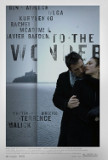To the Wonder (United States, 2012)
April 14, 2013
It should be noted that Terrence Malick's failures tend to be more interesting than many directors' successes. To the Wonder is not a complete package. Crafted with what can best be described as "a European sensibility," it's heavy on visuals and atmosphere and light on narrative. It's the cinematic equivalent of a collage with image following upon image, attempting to build a whole that is decidedly greater than its parts. To the Wonder's effectiveness depends on the degree to which it succeeds in that regard, and it doesn't quite achieve what Malick sets out to do. There are moments of pure poetry in the movie but the production as a whole seems overlong and repetitive and takes a detour or two that distract from the aching beauty of the central story.
To the Wonder is about love: love found, love lost, and love misplaced. The curtain rises on Neil (Ben Affleck), an American in Paris, and Marina (Olga Kurylenko) - two newly-minted lovers who are enjoying the so-called "Honeymoon phase" of their relationship. Eventually, Neil gets the urge to return home to Oklahoma and brings Marina and her young daughter, Tatiana (Tatiana Chiline), with him. Over time, the magic of their relationship fades. They begin to argue. Tatiana is unhappy. When her visa runs out, Marina elects to return to France rather than remain in the United States. After her departure, Neil re-connects with an old flame, Jane (Rachel McAdams). Their rekindled love affair appears to be headed toward permanence when Neil learns that Marina is desperately unhappy and seeking to return to the United States. Feeling responsible for her situation, he breaks it off with Jane and marries Marina so she can live in Oklahoma. But the happiness of their reunion is short-lived and they soon become two strangers under the same roof.
To the Wonder offers little in the way of dialogue and one could argue it might have been more effective as a silent film. Most of the speech comes in the form of pretentious, half-whispered voiceovers that are more distracting than effective. The characters almost never talk to one another, although they mouth poetic musings into the ether. Malick relies on images: faces, bodies, wheat fields, churning water, distant houses, horses, buffalo, skies, trees, Mont St. Michel - it's impressionistic. At times, it works. We feel the intensity of the emotions experienced by first Marina then, later, Jane. We sense how passions shift with the passage of time. Those who sit back and allow the currents to sweep them along will occasionally reach the places that Malick wants his audience to arrive at. But this kind of filmmaking is a fragile thing and the subplot involving Javier Bardem as a priest experiencing a crisis of faith is adrift without mooring. Every time Bardem takes over the narration or the movie steps away from its main story to pursue his situation, To the Wonder becomes less than wonderful.
The non-vocal approach benefits Olga Kurylenko greatly. Freed from having to manage her imperfect English, she can convey emotions through her expressive face and agile body. She's like a ballerina. Rachel McAdams is similarly empowered although she's a little more reserved. Ben Affleck, on the other hand, is simply there. Neil isn't a well-developed character. Although he's the anchor of all three acts, the narrative is related through the female point-of-view. As such, we see him only as Marina and Jane perceive him. The "independent Neil," so to speak, never surfaces. He's portrayed as cold and distant. Malick's writing and directing are at least in part responsible for why Affleck leaves such a minimal imprint on the viewer while McAdams and especially Kurylenko shine.
It's interesting to note that Malick has followed up what is arguably his most accessible film, Tree of Life (history of the world interlude notwithstanding), with his most challenging to-date. There's something of Days of Heaven's dreamlike approach to To the Wonder, but this is a more emotionally resonant experience than the earlier film. That could be because, like Tree of Life, there's a strong autobiographical element to To the Wonder. The arc of Neil's relationship with Marina, which is by far the strongest thread, is woven from strands of Malick's past.
Ben Affleck is on record saying that the most important thing to Malick isn't directing actors; it's getting the shot. This isn't surprising since the director's films have always been about telling a story primarily through visuals. He has been known to linger on picturesque images for long periods (think The New World), seeking to use those moments to alter the chemistry of the audience's mood - to slow things down and make the beauty immersive. To the Wonder is perhaps an extreme example of this style. Take away the out-of-place and bizarrely intrusive Bardem scenes and it might have been the perfect approach. For me, To the Wonder is a near miss. I don't regret having seen it but I find it difficult to give it a wholehearted recommendation. To the Wonder skews a little too far in the "too much style, too little substance" direction.
To the Wonder (United States, 2012)
Cast: Ben Affleck, Olga Kurylenko, Rachel McAdams, Javier Bardem, Tatiana Chiline
Screenplay: Terrence Malick
Cinematography: Emmanuel Lubezki
Music: Hanan Townshend
U.S. Distributor: Magnolia Pictures
U.S. Release Date: 2013-04-12
MPAA Rating: "R" (Sexual Content, Nudity)
Genre: DRAMA
Subtitles: In English and French with English subtitles
Theatrical Aspect Ratio: 2.35:1

Comments